| Revista Umělec 2010/1 >> A grand attack on the grand masters or The Eastern Destruction of Werstern Values | Lista de todas las ediciones | ||||||||||||
|
|||||||||||||
A grand attack on the grand masters or The Eastern Destruction of Werstern ValuesRevista Umělec 2010/101.01.2010 Ivan Mečl | en cs de |
|||||||||||||
|
…sounds good, don’t you think? We here in the West can really put together some cool sentences when it comes to progress or decline.
So, this is one of my first contributions to the topic of the end of the West as a concept – something I thought up all on my own (I’m not going to pretend otherwise), but which we’re going to make a big deal out of, since everybody is quivering in fear, self-flagellating and all that, and generally acting as if it’s all downhill from here. Which it probably is, but we should try to enjoy the ride. Tears would only make the apocalypse look blurry, and after all we’re used to things being clear and in focus. But getting back to that eastern destruction of the western tyranny of values … whoops, looks like a word slipped in there on me. We’re going to ignore the concept of emulation and forgery. Essentially, that’s a big joke anyway. But this is serious business. Big serious business, because (fortunately) we’re dealing here with a grand attack on the grand masters – for whom a minor and clumsy attack would be an insult. The objective, after all, is to destroy the Old Masters, our models and their inspirations. Our grand masters were always inspired by grand myths, grand ideas, grand stories, grand religious milestones and revolutionary worldly events. And miracles. And in the East, they’ve had it up to here with these Western things. They won’t say it straight up and definitely not in a language that we can understand or even want to understand. I’ll say it right now: we don’t really want to understand them. There’s a lot of truth to that, and this kind of self-criticism always sounds good, too. There’s a lot of that going around nowadays. For instance – once when I was at a Chinese art fair in Beijing, where a naïve Western gallery had paid heaps of dollars to rent some booths and was looking forward to going home with bags full of dollars from selling art to rich Chinese, an announcement comes over the public address system in Chinese: “Buy Chinese art! Foreign art is useless!” And the foreign gallery owners just smiled because they didn’t understand Chinese. They didn’t sell anything, but they told themselves that next time they would bring something similar to what the Chinese were doing. But they won’t sell anything next time, either. Because it doesn’t matter what they’re selling and what it looks like. They have to learn Chinese and the stuff has to be sold by Chinese. Or take the artist who came back from China and goes, “Get this, I got invited to some big international Europe-Asia exhibition and the day before the opening the main curator – Chinese, of course – writes in some newspaper that the Asian part is great and that the European art, just like he expected, wasn’t worth diddly. He thought we wouldn’t find out since the newspaper was in Chinese and besides, they bought all the European participants airplane tickets so that they’d be out of there the next day. But I’d changed mine ahead of time so that I could spend another week in Shanghai. A few days later, the European part was unlit and the equipment, like the projectors for instance, gone.” Maybe we’re just a little oversensitive. On the other hand, who in the West would have thought, in 1990, of holding a big Chinese exhibit in Europe? And if they had – maybe they would’ve turned off their lights after a week, too. Now that they’re rolling in dough in the East, however, and they’ve learned how to properly produce art, you’ll find them everywhere here, and we want to be seen in their new empire as well… so we’re just going have to forgive them a few things. But fair is fair, so I’m not going to play around with academic niceties, either. Some clever artists in China are running out of topics and aren’t quite sure what will catch our attention anymore. Nobody goes for self-conscious citations of other styles or ideas anymore; more than a few collectors want to gag at the mere sight of pop-com-art showing Mao, red flags, and jaunty cherubic little figures in overalls – that stuff can still be sold as souvenirs for elderly tourists. And those bloody, smeared performances and photos of them – they never really sold that well anyway. Their time will come, but only after we here in the West stop being afraid of our own excrement, and filth and total lack of comfort strike us as normal again. But what until then? Looks like the only thing left is to take on some real old famous stuff. Best of all, really, really famous. Better yet, the most famous of all. Not that it would be anything new. We’ve already defiled ourselves as much as we possibly could. But it all somehow stayed at home. So it’s actually kind of a new phenomenon when another culture is doing it. One culture parodying and defiling another. It also shows how their confidence has grown in the past few years. They’re saying to themselves, “check it out, they’re on their last legs” – and they’re right: here at home we keep our fucked-up situation a secret, while there the newspapers are full of it – so they’re trying to beat us culturally and morally as well. And since our morals were never much to write home about, they’ll make short work of our culture. And that’s just the beginning. Just out of spite, I’ll start in France. Probably because I like Céline – who is something like Federico Garcia Lorca, Ezra Pound, and Charles Bukowski all rolled into one. If you’ve read Céline, you know everything you need to know about the West’s soul. There’s probably nobody better in France. What’s important for us is that in his last books before his death he repeatedly says that in the end the Chinese will come anyway and then they’ll really make a mess of things. Or take Mad Meg, a totally obsessive artist who has drawn many extensive stories and black-and-white variations on paintings by Jan Van Eyck, Rubens, Rembrandt, Peter Bruegel, Fillippo Lippi and Hieronymus Bosch. Because she is French, she doesn’t totally fit into this wannabe-paradoxical concept of East and West, but that’s what makes it so interesting. Anyway, I can’t think of any other way to justify including her. As is obvious, Mad Meg has no love lost for our western order, so there is some connection after all – and to make this connection even clearer, if I were to save up for another plane ticket to China, then I’d take some of her drawings with me. Once the Chinese see them, they’ll fall in love with Mad Meg ‘cause they love criticism of the West. They’ll make her an honorary citizen and maybe she’ll even move there. Then I won’t have to try so hard to make the connections work, but because I’m writing it now, I have to be… what? – Honest. To speak the truth and so on. The way we like to, here in the West. In China, they really know how to blather on sometimes! Anyway, Noelle Papay writes about Mad Meg on another page, so you’re not limited just to my ongoing provocations. And for the more dignified, Céline will do. But back to China. “I simply feel that the diversified world is gradually losing its cultural gaps, that the differences in nationality, geography and individuals are fading. Sticking to traditions is just one of our own good wishes. I strongly believe that the people of the world will be living in an identical way. As for eliminated, probably, it is a sort of tragedy, but to the remains, it may mean nothing,” says Chinese painter and creator of animated films Zhang Gong, and his work supports this claim. Most of his paintings made around 2007 are populated with a “best of” of heroes of western comics and animated movies. This varied and growing band includes two eastern-looking creatures, one of whom is called Miss Panda and the second is a panda. Miss Panda has giant black eyes and resembles a woman with an extended head like one of Giger’s aliens. The panda looks like a member of the Ku Klux Klan slapped together by a child using playdough. It has two giant black eyes on its hood. Sounds like something out of a horror movie, what? Sure, but Kenny, Bart, and Mickey sometimes also strike them as weird in the East. From the viewpoint of eternity, everyone looks normal and like a monster at the same time. And what do you know – a metaphor is born! Nothing positive, hmm? But our artist is a real sourpuss and adds: “Up till now, I have never seen any such a person living a happy life, always accompanied by hardship and mishaps. Especially, facing the present prosperity, I always have a kind of unspeakable fear, thinking that the more prosperous the society, the more dangers we will be facing.” Like I’m always saying – kill yourself right after birth! Anyway, this Chinese guy – that’s almost still okay. His paintings, as you can see for yourself, hold up alright. Nothing to write home about when it comes to form, but most artists’ technique is far worse. And he means well … he’s really quite a contemplative guy. He’s quite critical in fact; you could almost say that he sees the world from an almost Western point of view. He’s worried about growth in China – and we here in the West are all afraid of China. Even Jack London in his short story The Unparalleled Invasion, but we haven’t been allowed to publish that one since 1924. And it’s pretty strong stuff, let me tell you. It’s about how the Chinese – here it comes – invade the West en masse and eat everything and everyone. The situation is solved by the USA, which launches biological weapons over Europe and Asia from balloons. Then they wait until everyone dies, and the war is won. Surprised at what that wandering spirit London came up with? I’ve been looking for that collection of short stories for a while. They had it at my library, but either someone stole it or some girl never returned it. If by chance you happen to have it, give me a ring. I would love to have it translated into Chinese. But the worst is yet to come. When I was in China, I made friends with a certain carefree Mexican gallery owner and his Hispanic artist friends. Some of them had been in China for quite some time, and they were either afraid or disdainful of everything. The Arcaute Gallery – that was the guy’s name – was on the first floor above a Chinese artist we will soon be talking about. They all knew him, said hello, but had never been inside his studio. The Hispanics just faint-heartedly looked through the shop-window-like glass. When I asked them about the artist, they wrung their hands and moaned that he painted horrible things. When I asked what kinds of things, they just threw up their arms and cried, “horrible things,” but they were afraid to go inside. This of course gets a cynical Slav’s attention. So I tried to discern through the window what kind of things there were on these huge paintings. Once, the artist just happened to be in, and he came out and invited me in. The Hispanics came running from the shadows, studios and galleries, gesticulating wildly and hollering at me not to go in. So I went in, and what I saw is what you can see across the whole page, because its totally and beautifully twisted and insane… and the artist of course doesn’t think so at all. There was more of it, of course, but this one painting of his stuck in my mind and I’ve got to unload it here somehow. I realize that many of you will feel bothered by my dumping my trauma on you, but as long as I’m the publisher of this magazine, there just are things you’re going to have to put up with. They won’t publish my writing elsewhere, so I’m holding on to the only option I’ve got. Things were easy with Zhang Gong. He loves to talk about himself and to give interviews. Xue Jiye, on the other hand, when asked for the meaning of his work, replied: “Dear Mr. Mečl, you can give my painting any meaning you like.” Now that’s what I call playing fair. ‘Cause it’s real perverted shit. And we here in the West just looove that kind of stuff. It looks shocking, a brilliantly mastered Chinese take on Ken Currie, and it’s big as hell. Here in the West, we get a bit lazy with this kind of shit. For instance, we can photograph ourselves in all kinds of perverted positions and so on, but this must have taken a whole lot of effort! And there were dozens of these paintings in that studio! Each more shocking than the other. That would give Václav Bělohradský – who writes about the “solidarity of the dazed” – a whole legion of dazed individuals. Maybe Xue Jiye has no idea what he’s doing. He’s merely a tool for my plans, so that we might add one more word to this article’s subtitle, turning the whole sentence into “the unconscious eastern destruction of the western tyranny of values.” Then again, no. I’m not that naïve. One sign of a civilization’s decline is when it is no longer capable of making fun of competing civilizations and adopts their morals and manners, and thus their view of the world. Which is why I won’t advise western artists to start offering various caricatures of Confucius, like painting him with a giant penis shoved up the ass of… a panda, for instance. Or Scooby Doo and the Case of the Missing Kung Pao Chicken, Winnie the Pooh sentenced to death by firing squad for eating honey and Elmer Fudd for illegal possession of a firearm. I think we’re a little more advanced when it comes to humor. But the fact that we take the East so goddamn seriously is a real catastrophe. In China, some government big-wig responsible for the economy casually remarks, “by the way, we’ve got a bunch of your dollars here so you better make sure they don’t drop in value,” and the West answers, “right, sorry – we’ll deal with it somehow... we’re trying, but you know – times are tough” – instead of someone saying: “Boy, are you stupid. Why don’t you try melting them down and stuffing them in your blankets, cause… well… we were kind of wrong about that whole global warming thing.” Or some Eastern mucky-muck makes an official visit to the West and some activists show up to holler and wave pictures of corpses. Instead of the mucky-muck staying home, they send the activists home. And if they don’t leave on their own, they get whacked upside the head. It’s actually all pretty funny, except that we’re not laughing anymore. They’re laughing elsewhere now. That’s those adopted morals and that new viewpoint on things. On the other hand, those pictures of corpses didn’t please those in power on any side of the globe. Maybe it’s that in the West we no longer pretend that human rights are above any system. Maybe people figured out that tickets to this fiction cost too much, so they’ve decided to see the reality show for free. In the 1990s, Western intellectuals and politicians declared the victory of the West. But they forgot that communist intellectuals and politicians had done the same thing with socialism and the eternal brotherhood of nations. Of course, things always went wrong right after the announcement, and the brotherhood of nations even went to war against each other. The West repeated this mistake; we are in an unacknowledged freefall, staring at caricatures of ourselves made by Eastern artists, and all we can say is, “what a fine mess we’ve gotten ourselves into!” Without any truly satisfactory and proficient response. We’re serious and dignified. We deal with it... slowly and deliberately. After all, it’s all so terribly complicated. We kneel in deference to our own tale, …but at a funeral. Instead of shouting, “man, that’s some crazy shit!” and laughing at the world with all our might. Even at the risk of being led out... into the fresh air. Appendix Before this text made it into the magazine, I gave it to some colleagues to read. They were more interested in London’s literary offense than my ideas, but I didn’t take it personally and began hunting for it. It was last published east of Europe’s borders with the Slavs in 1924, and since then it’s been mostly White Fang over and over. What a shame! London’s got many more catastrophic and social visions up his sleeve. He wrote under the influence of alcohol, drugs, and the revolutionary scientific discoveries of the late 19th century. Every prophet whose predictions have come true was on something. We Slavs are an unreliable lot, occupying the buffer zone between Asia and the European West. This rabble originally came from India, it has nothing common with the West and was pushed into eastern Europe by the incessant beatings they got from the Asian tribes, with whom they had roughly the same relationship as today’s Slavs with the Roma. Assimilate or let die out. Because in the early 20th century, the influence of the East was on the rise, the frightened nations of Slavic Europe were afraid to publish similarly offensive works of fiction. They’re fated to eternally fidget and read cowboy stories. The National Library has two copies. One is damaged and is not lent out. Just to be safe, the other is not lent out, either. In the end, I found it offered online by an antiquarian bookseller somewhere in the middle of a giant cement communist housing estate between Prague and the warehouse landscape that stretches from Karlštejn to Pilsen. We ordered the book, but a part of the building collapsed just as our colleague arrived to pick it up. The book would clearly seem to be cursed. She managed to dig it out of the ruins a week later. The story had been translated at a time when the English-Czech dictionary contained 400 entries and when any literary style resembling chimerical visions was automatically translated into the language of Karel Sabina.1 In order to spare Czech readers phrases such as “all henceforth preceding ties were sundered,” I took a couple days off and headed to my cabin above a cliff with some opium and a bottle of gin in order to select and re-translate a few of the juicier passages. Czech readers thus need not be jealous of their English-speaking counterparts... although London’s drunken visionary English is pretty strange indeed. 1 A Czech author of romantic fantasy and an under-appreciated traitor to the nation Translated from Czech by Stephan von Pohl.
01.01.2010
Artículos recomendados
|
|||||||||||||
|
04.02.2020 10:17
Letošní 50. ročník Art Basel přilákal celkem 93 000 návštěvníků a sběratelů z 80 zemí světa. 290 prémiových galerií představilo umělecká díla od počátku 20. století až po současnost. Hlavní sektor přehlídky, tradičně v prvním patře výstavního prostoru, představil 232 předních galerií z celého světa nabízející umění nejvyšší kvality. Veletrh ukázal vzestupný trend prodeje prostřednictvím galerií jak soukromým sbírkám, tak i institucím. Kromě hlavního veletrhu stály za návštěvu i ty přidružené: Volta, Liste a Photo Basel, k tomu doprovodné programy a výstavy v místních institucích, které kvalitou daleko přesahují hranice města tj. Kunsthalle Basel, Kunstmuseum, Tinguely muzeum nebo Fondation Beyeler.
|







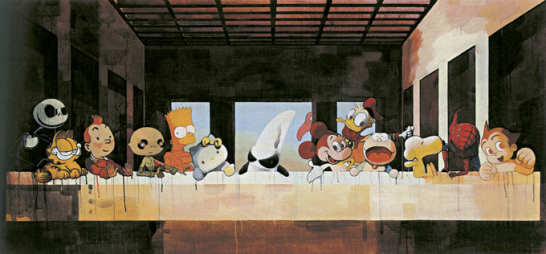








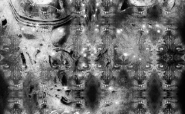



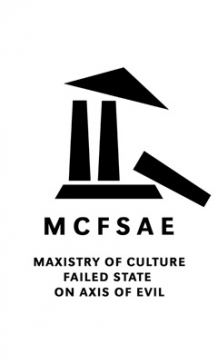






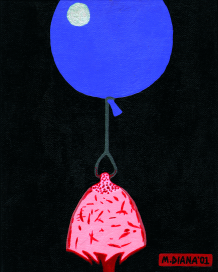




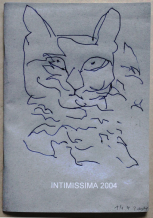

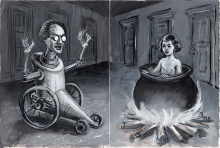
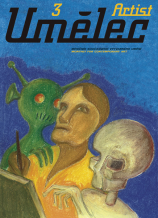


 New book by I.M.Jirous in English at our online bookshop.
New book by I.M.Jirous in English at our online bookshop.
Comentarios
Actualmente no hay comentariosAgregar nuevo comentario